This page contains automatically translated content.
Eco-concrete from household waste slags
 Image: University of Kassel.
Image: University of Kassel.Concrete consists of cement, sand and gravel, water, and usually concrete admixtures and admixtures, and is the most widely used building material in the world. But its environmental footprint is not particularly good: the cement industry emits about 2.5 billion tons ofCO2 annually, about 3.7 times more than aviation. "As the world's population grows, the demand for building materials will also increase and the situation will become even worse," says Prof. Dr. David Laner, head of the Department of Resource Management and Waste Technology at the University of Kassel and coordinator of the project. Together with Prof. Dr. Bernhard Middendorf from the Department of Materials in Construction and Construction Chemistry and industrial partners, they are launching an innovative and interdisciplinary project: a special recycling process is to be used to produce concrete, a popular building material, in a more environmentally friendly way.
More environmentally friendly concrete
In 2016, around 20 million tons of municipal waste was incinerated in Germany. The amount of bottom ash from this was around 5 million tons. Optimal utilization of municipal solid waste (HMV) ash can be the more ecological solution for concrete production. This is the aim of the project "HMV-Öko-Beton: Ökologische Optimierung von Betonprodukten durch Nutzung mineralischer Fraktionen von Hausmüllverbrennungs-Rustasche" at the University of Kassel.
Different fractions can be identified in the incineration of household waste. Using coarse household waste slag as a partial substitute for sand and gravel is already state of the art. "So far, however, no cement has been replaced. That's one of our goals: we want to reduce the amount of cement in concrete by at least 20 percent," says Prof. Middendorf. To this end, the scientists are testing the finest fraction of household waste slag.
The development of a more environmentally friendly concrete should continue to provide a high-performance and sustainable building material. The high-quality use of mineral HMV ash in concrete can reduce the proportion of HMV ash that ends up in landfills from nearly 60 percent at present to about 20 percent. "For Germany, this would mean a reduction in landfill capacity of two million tons per year . This will additionally conserve natural resources to the same extent, especially sand and gravel, through increased recycling ," explains Prof. Laner.
Eco-concrete products
The development of the composition for concrete made from incinerated household waste grate ash alone is not to be the end of the story: More environmentally friendly concrete products are planned. "We can use the eco-concrete to make street furniture, for example. We see further potential applications, particularly in noise barriers, paving stones and precast concrete products," says Prof. Middendorf.
For the project, the scientists at the University of Kassel are collaborating with KIMM GmbH & Co. KG from Wabern and BAUREKA Baustoff-Recycling GmbH from Kassel, as well as with the waste-to-energy plant (MHKW) in Kassel. The HMV-Öko-Beton project is being funded by the Deutsche Bundesstiftung Umwelt (DBU) with around 250,000 euros for two years.
Contact:
Prof. Dr. David Laner
University of Kassel
Department of Resource Management and Waste Technology
E-mail: david.laner[at]uni-kassel[dot]de
Prof. Dr. Bernhard Middendorf
University of Kassel
Department of Materials in Construction and Construction Chemistry
E-mail: middendorf[at]uni-kassel[dot]de
Press contact:
Sebastian Mense
University of Kassel
Communications, Press and Public Relations
Tel.: +49 561 804-1961
E-mail: presse[at]uni-kassel[dot]de